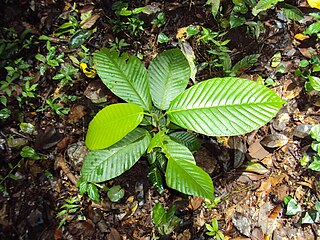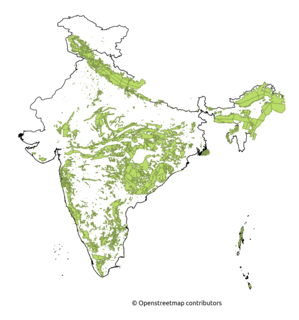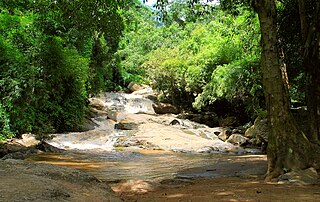Platanus kerrii is an evergreen tree, native to Southeast Asia. The leaves are elliptical to lanceolate. The fruits are borne in globose heads, each of which is sessile on a long peduncle. There are up to 12 heads on a peduncle.

Dipterocarpus is a genus of flowering plants and the type genus of family Dipterocarpaceae.

Mount Harriet National Park is a national park located in the Andaman and Nicobar Islands union territory of India. The park, established in 1969, covers about 4.62 km2 (18.00 mi2). Mount Harriet, which is part of the park, is the third-highest peak in the Andaman and Nicobar archipelago next to Saddle Peak in North Andaman and Mount Thullier in Great Nicobar.
Dipterocarpus acutangulus is a species of tree in the family Dipterocarpaceae. The species name acutangulus is derived from Latin and refers to the ribs of the fruit calyx tube. It is found in peninsular Malaysia and Borneo, where it is locally known as keruing merkah or keruing beludu. It is an emergent tree up to 60 m tall, The tree occurs in mixed dipterocarp forests found on sandy and sandy clay soils on coastal hills and inland ridges, up to 1000 m altitude. It occurs in at least one protected area.
Dipterocarpus coriaceus is a species of tree in the family Dipterocarpaceae endemic to Kalimantan, Sumatra and peninsular Malaysia. This very large tree occurs in mixed dipterocarp forests on hillsides and undulating land. This species was reported in the New Straits Times to be extinct in Peninsular Malaysia in July 2013 as its last natural habitat in Bikam Forest Reserve in Perak was de-gazetted and cleared for oil palm cultivation.

Dipterocarpus gracilis is a critically endangered species of tree in the family Dipterocarpaceae, native to South Asia and Southeast Asia.
Dipterocarpus hasseltii is a species of tree in the family Dipterocarpaceae. This large tree occurs in lowland dipterocarp forest and is cut for keruing timber. It is found in Indonesia, peninsular Malaysia, Sabah, the Philippines, Thailand and Vietnam. It is recorded in the sacred forest of Sangeh, Bali.
Dipterocarpus validus is a species of tree in the family Dipterocarpaceae, endemic to Kalimantan, Sabah and the Philippines. The species is common in both primary and secondary forest, often occurring along rivers and in freshwater swamps. It yields wood-oil and is cut for keruing timber.

Danum Valley Conservation Area is a 438 square kilometres tract of relatively undisturbed lowland dipterocarp forest in Sabah, Malaysia. It has an extensive diversity of tropical flora and fauna, including such species as the rare Bornean orangutans, gibbons, mousedeer, clouded leopards and over 270 bird species. Activities offered are jungle treks, river swimming, bird watching, night jungle tours and excursions to nearby logging sites and timber mills.

Dipterocarpus grandiflorus is a species of flowering plant in the Dipterocarpaceae family. It is an endangered medium hardwood tree in South-East Asia and India. Its wood is used to produce good quality charcoal, paper pulp, and timber sold under the Keruing designation. Its gum is used locally as a waterproofing varnish. The tree itself is very useful for nitrogen fixing, erosion control, soil improvement, and watershed regulation.

Dipterocarpus caudatus is a species of plant in the evergreen or semi-evergreen family Dipterocarpaceae. The species name is derived from Latin and refers to the narrow acumen of the leaf apex. It is an emergent tree, up to 50 m tall, in mixed dipterocarp forest on dry ridges. It is found within Sumatra, coastal Peninsular Malaysia, Singapore and Borneo. It is a medium hardwood sold under the trade names of Keruing. It was formerly most abundant along the coastal hills on sandy soils, but is endangered due to land conversion. D. caudatus is found in at least one protected area.
Dipterocarpus confertus is a species of plant in the family Dipterocarpaceae. The species is named derived from Latin and probably refers to the indumentum. It is an emergent tree, up to 50 m tall, in mixed dipterocarp forest on leached yellow clay soils. It is endemic to Borneo. The species is threatened by deforestation. It is a medium hardwood sold under the trade names of Keruing. It is found in at least one protected area.
Dipterocarpus conformis is a species of plant in the family Dipterocarpaceae. The species is named derived from Latin and alludes to the great similarity in vegetative characters with two other large-leaved Dipterocarpus species. There are two subspecies; D. conformis subsp. conformis which is confined to Aceh and North Sumatra and D. conformis subsp. borneensis which is confined to Borneo. D. conformis subsp. borneensis is an emergent tree, up to 50 m tall, in mixed dipterocarp forest on clay soils over shale. It is a medium hardwood sold under the trade names of Keruing.
Dipterocarpus crinitus is a species of plant in the family Dipterocarpaceae. The species name is derived from Latin and refers to golden-brown bristle-like hairs that cover the plant parts. It is an emergent tree, up to 60 m tall, in mixed dipterocarp forest on sandy clay soils. It is a medium hardwood sold under the trade names of Keruing. It is found in Peninsular Thailand, Sumatra, Peninsular Malaysia and Borneo.
Arthur Francis George Kerr (1877–1942) was an Irish medical doctor. He is known particularly now for his botanical work, which was important for the study of the flora of Thailand.

Tropical Evergreen forests of India are found in the Andaman and Nicobar Islands, as Western Ghats, which fringe the Arabian Sea, the coastline of peninsular India, and the greater Assam region in the north-east. Small remnants of evergreen forest are found in Odisha state. Semi-evergreen forest is more extensive than the evergreen formation partly because evergreen forests tend to degrade to semi-evergreen with human interference. There are substantial differences between the three major evergreen forest regions.

Doi Suthep–Pui National Park is a national park in Chiang Mai Province in Thailand. It includes Wat Phra That Doi Suthep, a Buddhist temple, and Bhubing Palace, the winter residence of King Bhumibol Adulyadej and family. The park is a protected area for flora, fauna, and habitat.
Dipterocarpus dyeri (Khmer: rôyiëng, chhë tiël pruhs, chhë tiël th'nô:r, local name Kompong Thom: chhieutiel chgor, name used for commercial timber and the group of trees harvested for such: keruing, Vietnamese: Dầu Song Nàng, is a species of tree in the family Dipterocarpaceae found in Myanmar, Thailand, Peninsular Malaysia, Cambodia and Vietnam. The tree is found in lowland semi-evergreen dipterocarp forests and Schima/bamboo forests, an alternative habitat description is mixed dense forests of the plains, mainly among rivers and valleys. The tree is a climax or late successional species, which in some secondary forests forms relatively young pure colonies. The conservation status is based on rates of habitat loss, the major threat to the taxa, though in Vietnam it is cited as having a less threatened conservation status of Vulnerable.

Dipterocarpus turbinatus is a species of tree in the family Dipterocarpaceae native to north-eastern India and mainland Southeast Asia, and cultivated in surrounding regions. It is an important source of the wood known as keruing, and is often used in the plywood industry.









